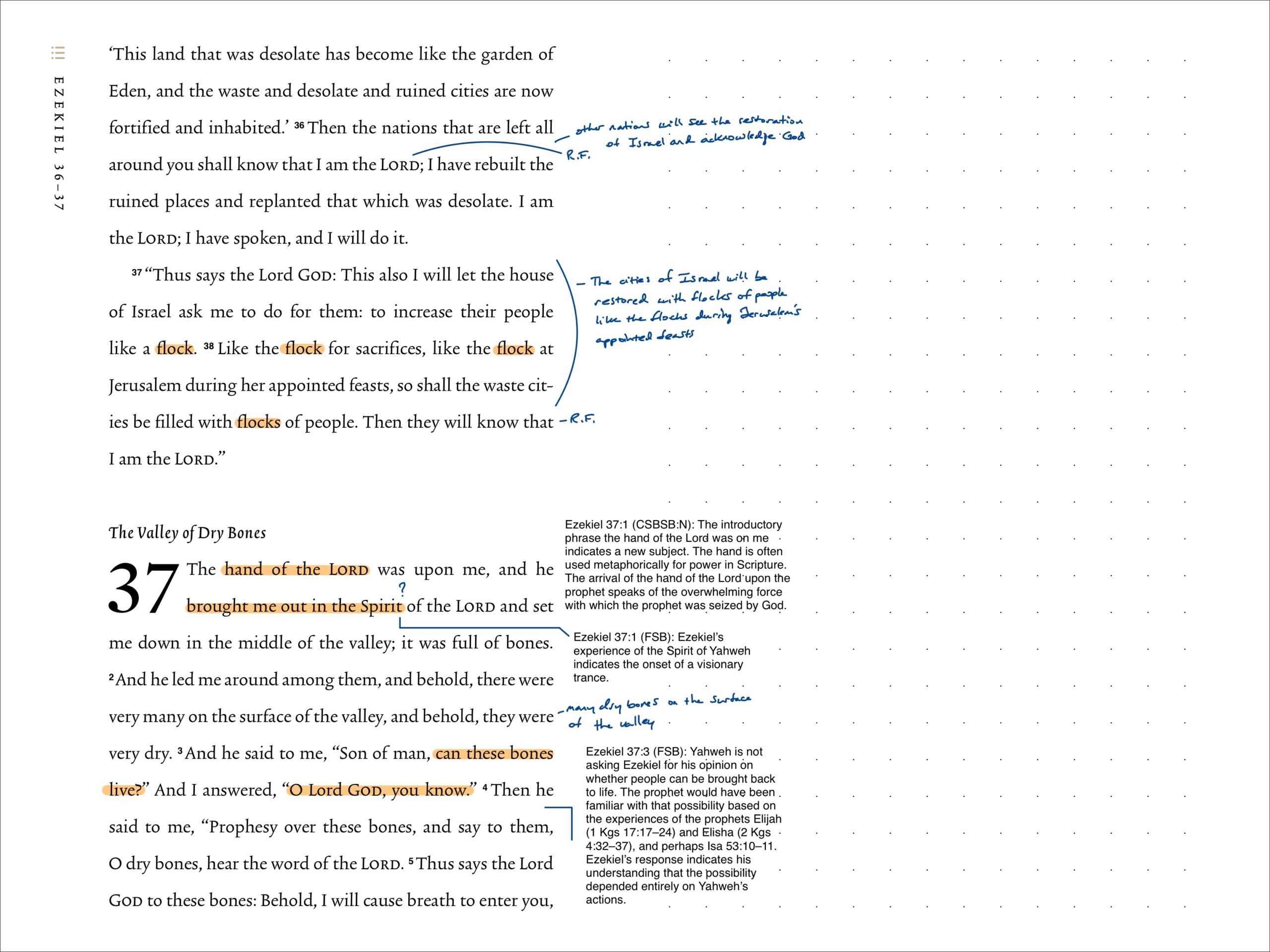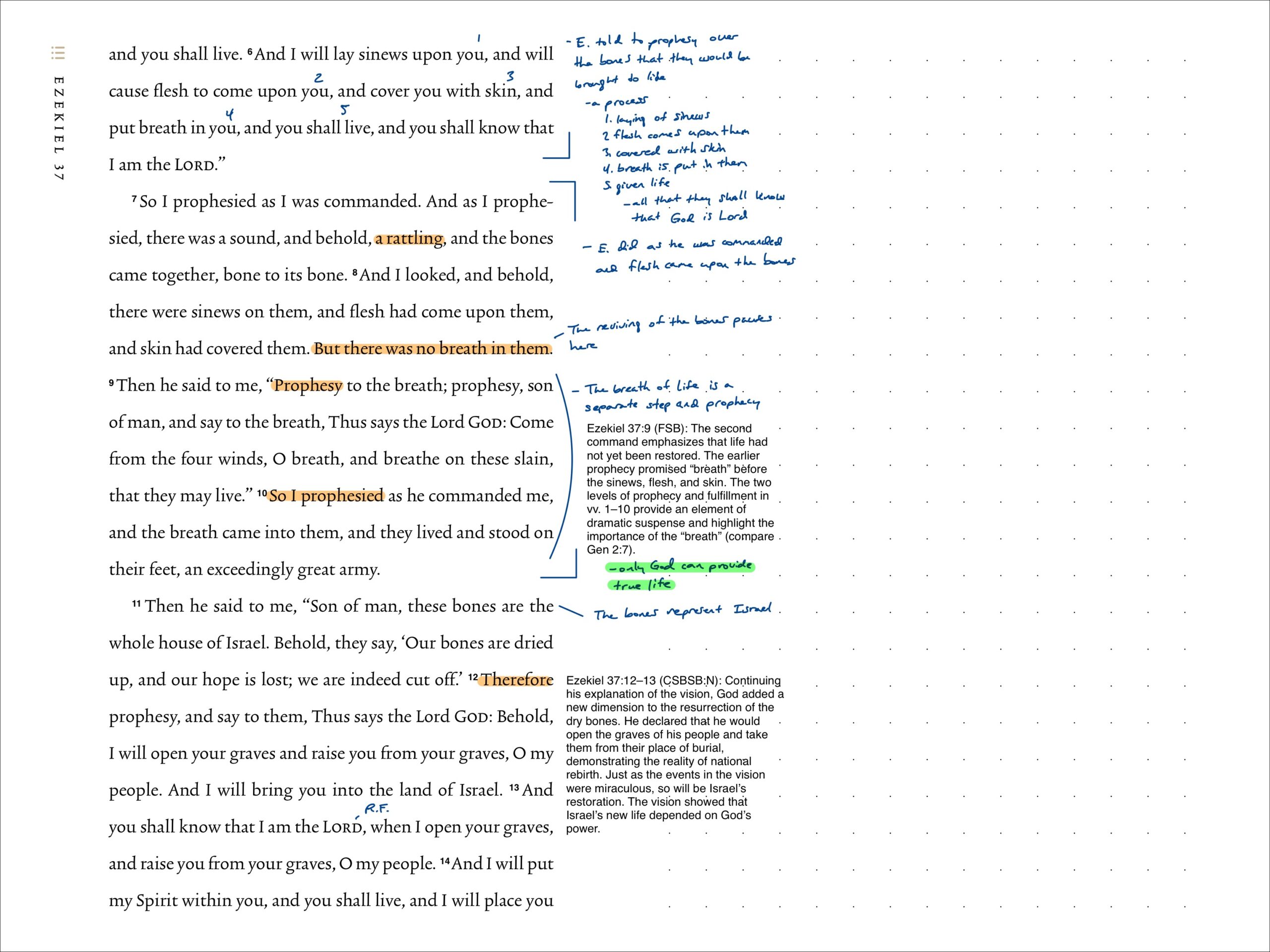| Date | Version | Reading Plan |
|---|---|---|
| @September 28, 2023 | ESV (2016) | ESV Prophets Plan 2023 |
Pericopes
- The Valley of Dry Bones
- I Will Be Their God, They Shall Be My People
Notes
The chapter opens with the hand of the LORD bringing Ezekiel out “in the Spirit” to a valley that was full of very dry bones. The introductory phrase the hand of the LORD was on me indicates a new subject. The hand is often used metaphorically for power in Scripture. The arrival of the hand of the Lord upon the prophet speaks of the overwhelming force with which the prophet was seized by God. Ezekiel’s experience of the Spirit of Yahweh indicates the onset of a visionary trance.
Ezek. 37:3 is an exchange between the LORD and Ezekiel of whether the bones can live. Ezekiel responds that God knows. Yahweh is not asking Ezekiel for his opinion on whether people can be brought back to life. The prophet would have been familiar with that possibility based on the experiences of the prophets Elijah (1 Kings 17:17–24) and Elisha (2 Kings 4:32–37), and perhaps Isaiah 53:10–11. Ezekiel’s response indicates his understanding that the possibility depended entirely on Yahweh’s actions.
In Ezek. 37:4-6, God instructs Ezekiel to prophesy over the bones that they will come to life. God lays out a process of 1) laying of sinews, 2) flesh comes upon them, 3) covered with skin, 4) breath is put in them, 5) given life. This restoration of life is so that they would know that He is the LORD (Ezek. 37:6).
In Ezek. 37:7-10, Ezekiel does as he is commanded and flesh comes upon the bones. However, the revival process stops at the breath (Ezek. 37:8). The breath of life is a separate step and prophecy. The two levels of prophecy provide an element of dramatic suspense and highlight the importance of breath (compare Gen. 2:7).
Ezek. 37:11-14 describe how the bones represent Israel who thought their hope was lost and that they were cut off. God declares that He would open the graves, taking them from their place of burial, demonstrating the reality of national rebirth. Just as the events of the vision were miraculous, so will be Israel’s restoration. The vision showed that Israel’s new life depended on God’s power. Through it all, they would come to know that God is LORD (Ezek. 37:14).
In Ezek. 37:15-23, Ezekiel is told to write on two sticks: one for Judah and one for Joseph (Ephraim). The two sticks are to be joined “into one stick, that they may become one” in his hand (Ezek. 37:17). Ezekiel’s sign-act predicts a future restoration of Israel and Judah into a unified kingdom. When the people ask what the joining of the sticks represents (Ezek. 37:18), Ezekiel is to tell them of God’s plan for Israel and that He will:
- Gather them (Ezek. 37:21)
- Bring them into their own land (Ezek. 37:21)
- Establish a King over them (Ezek. 37:22)
- Unify the kingdom (Ezek. 37:22)
- Idolatry will be no more (Ezek. 37:23)
- Salvation from backsliding (Ezek. 37:23)
- Cleansing (Ezek. 37:23)
- They will be God’s people (Ezek. 37:23)
- God will be their God (Ezek. 37:23)
This further explanation of the sign-act goes beyond the prediction of unity for Israel and Judah to the ultimate expectation of a Messiah, in the role of a Davidic king ruling over a new united monarchy.
The remaining verses (37:24-28) are of the reign of the Davidic King and the establishment of a new covenant. The people will have “one shepherd” and will walk in God’s rules and be careful to obey His statutes (Ezek. 37:24). David, God’s servant, will be their “prince forever” (Ezek. 37:25) and God will establish with them a permanent “covenant of peace” (Ezek. 37:26). This everlasting covenant is the culmination of God’s plan for salvation. Recognition will then come to the nations that it is God who sanctifies His people (Ezek. 37:28).
Application
Through the dramatic imagery of the revival of dry bones, God showed that He has the power to restore life. This represented God’s people whom He would gather from foreign nations, bring back to their own land, unify the kingdom and inaugurate a new, everlasting covenant of peace. God will appoint a new Davidic King, a Messianic promise, who will reign in His sanctuary and “in their midst forevermore” (Ezek. 37:28)
Something in the reanimation of the dry bones stuck me today, namely that it paused at the point of breath (Ezek. 37:8). Everything else was there (sinews, flesh and skin that had covered them), but they were missing the breath of life. It was a wonderful (and humbling) reminder that life is far more than the sum of organic components. God is the Author of life and it can be brought about no other way. However far we come with scientific advances, we are still limited to the elements and processes God has already provided. The idea of “life from nothing” should elicit a sense of awe that we serve an all-powerful Creator.
Scripture Journal Notes
Commentaries & Resources Used
- ESV Study Bible. (Wheaton, IL: Crossway, 2008)
- Faithlife Study Bible (Lexham Press, 2016)
- Believer’s Bible Commentary (Thomas Nelson, 2016)
- CSB Study Bible Notes (Holman Bible Publishers, 2017)
- Matthew Henry’s Commentary on the Whole Bible (Guardian Press, 1976)
- The Bible: A Reader’s Guide (Sterling Publishing, 2011)
- The Infographic Bible (Zondervan, 2018)
- ESV Digital Scripture Journal (Crossway, 2019)



